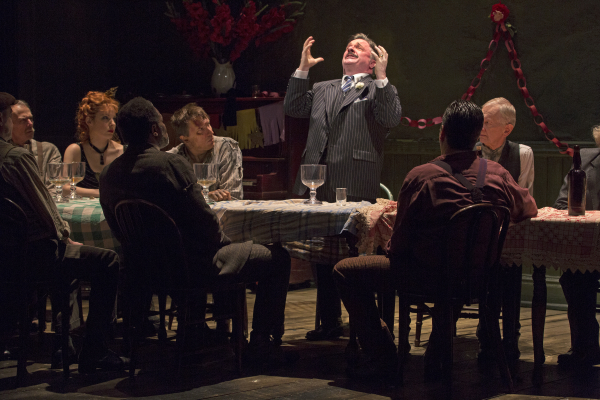The Iceman Cometh

(© Richard Termine)
Often hailed as Eugene O'Neill's great masterpiece, The Iceman Cometh is not an easy play to sit through. At nearly five hours (all set in the dank confines of a lower Manhattan bar during the Taft administration), the play is a marathon for actors and audiences alike. One gets the sense that O'Neill could have benefited from a good editor. Considering the fact that director Robert Falls has excised an entire character from the script (the ex-cop Pat McGloin), he and the folks at the Goodman Theatre seem to believe this as well. That production now comes to BAM's Harvey Theater after an initial 2012 Chicago run. Sensitively acted, artfully designed, and cleverly directed, this Iceman is the depress-fest O'Neill always meant it to be (character removal aside).
As literary critic Harold Bloom observed, "O'Neill from the start seemed to know that his spiritual quest was to undermine Emerson's American religion of self-reliance." A lapsed Catholic and the son of an Irish immigrant actor, O'Neill was deeply suspicious of the prevailing American mythology of rags-to-riches. Rather than a feel-good play about the can-do American spirit, The Iceman Cometh is the ultimate downer. Its takeaway: Abandon all hope.
Sharp-tongued Irish-American Harry Hope (Stephen Ouimette with acidly delicious diction and delivery) is the proprietor of a saloon and boarding house full of sad old drunks. There's down-and-out Harvard Law grad Willie Oban (the erudite and terrifyingly shaky John Hoogenakker), wounded British army hero Cecil Lewis (John Reeger), and his Boer War nemesis-turned-buddy Piet Wetjoen (John Judd), to name a few. (The latter two have a nice chemistry, one of the few heartwarming glimmers in this pool of despair.) They all survive on a diet of cheap booze and pipe dreams, rarely even retreating to their upstairs rooms for sleep. The play opens with the men passed out in the darkness of a back room.
The one highlight on their calendar is the regular appearance of traveling salesman Theodore Hickman, or "Hickey" (Nathan Lane). It's no wonder why: He's the life of the party, showering the barflies with free drinks. But this time is different. Hickey has seen the light and is stone-cold sober. He wants to share his new philosophy with his old friends. Brimming with gifts and advice, Lane plays Hickey like Oprah Winfrey with a mustache.
Hickey charismatically preaches a happy nihilism to his 12 (or in the case of this production, 11) disciples. He believes that if the men can only abandon their dreams, they can finally find peace in their slow march to the grave. Lane is magnetic as the traveling salesman-turned-evangelist of death. We would probably jump on his bandwagon, if it weren't for our overwhelming suspicion that he is only doing this to make himself feel better about a terrible secret.
The understated but powerful performance of Brian Dennehy gently nags us into this misgiving. He plays former anarchist (and current "grandstand philosopher") Larry Slade, this story's doubting Thomas. Dennehy makes him a beaten-down figure, his back arched under the weight of decades of disappointment. He shares a B-plot with youngster Don Parritt (the teeth-clenching Patrick Andrews) — the wayward son of his committed anarchist ex-girlfriend — whom Slade regularly (and coldly) swats away. Unlike the bombastic Hickey, Dennehy's Slade offers a quiet sincerity and honest brevity, a rarity in this play.
There is nothing economical about O'Neill's writing, but it does offer plenty of big juicy monologues for great actors, of which there are many in this cast. Salvatore Inzerillo is imposing and authentic as the ox-like bartender Rocky. As Pearl, Margie, and Cora (the bar's resident hookers), Tara Sissom, Lee Stark, and Kate Arrington share a hearty rapport. Playing gambler Joe Mott (the play's only African-American character), John Douglas Thompson utilizes his powerful growl to create some of the play's most exciting moments.
Standing out among them all is Lane, who peps up this dismal affair with a maniacal fervor. His fourth-act monologue is this play's Everest, and Lane makes a bold attempt to reach the summit. Through his ultra-committed performance we acutely feel his conflict. We get to know the goodness and lovability of his long-suffering wife, Evelyn, even though we never get to meet her in person. Yet even Lane can't breathe life into this meandering death march of a soliloquy. By the end, he is screaming, gasping for breath, and turning beet-red. It's as if he's drowning in a sea of overwrought sentiment.
Director Falls attempts to activate long passages like these with occasionally inexplicable blocking, featuring plenty of pacing and dramatic crosses. Natasha Katz's lighting seems to randomly dim during certain moments, as if a cloud were passing overhead. It makes us feel as if we've slipped into an alternate universe in which time has no meaning. Kevin Depinet reinforces this purgatory-like tone with his sets, which feature high walls and few if any avenues for natural light. The forced perspective of his third-act set is breathtakingly beautiful and also deeply unsettling: The door to the exit of this inescapable limbo seems so very far away.
After the first four hours of The Iceman Cometh, you can't help but relate to its zombielike characters: staring into a void of nothingness, hoping for it all to end.










